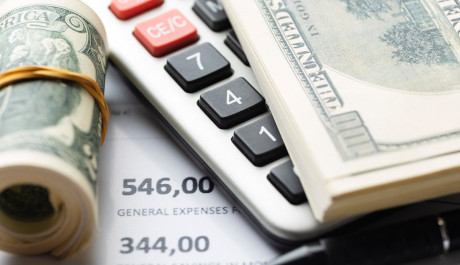What Is a Credit Score and How to Improve It?
A credit score is a crucial component of your financial health. It may seem that your credit rating is important only if you're going to get a loan in the future. However, its importance goes beyond borrowing.
Your credit score influences not only your ability to get a credit card or apply for a mortgage. Additionally, you can face problems trying to rent a house or even get a job associated with finances. That is why it's crucial to maintain your rating at an acceptable level and always keep track of it. Let's find out what is considered good credit and how you can bring your rating to this level.

Understanding of a Credit Score
A credit score is a numerical representation of a person's creditworthiness, which is determined based on their credit history. It is a three-digit number ranging from 300 to 850. Within this range, there are different categories that correspond to a borrower's creditworthiness. Each credit bureau can use its own range. Here are some common meanings:
- Bad credit score. A credit score below 580 is considered bad. It indicates a high risk of default. With a bad credit score, it can be challenging to obtain credit. If you do, you will be more likely to pay higher interest rates and fees.
- Fair credit score. A credit score between 580 and 669 is considered fair. It suggests that a borrower may have a few negative marks on their credit history in the past. Fair credit is still considered a moderate risk.
- Good credit score. A credit score between 670 and 739 is good. Borrowers with good credit scores can usually qualify for most loans and expect to get competitive interest rates and reasonable terms.
- Very good credit score. This is a rating that ranges from 740 to 799. Those who have very good credit may be eligible for lower interest rates and better terms.
- Excellent credit score. A credit score above 800 is considered excellent. It reflects a borrower's long-term creditworthiness and demonstrates that they are low-risk borrowers.
Why Are Credit Scores Important?
Credit scores are important because they play a critical role in determining an individual's financial health and ability to manage finances efficiently. A credit score represents an individual's creditworthiness based on their past credit history. A good credit background can help you borrow money at lower interest rates and get better loan terms. On the contrary, a poor credit score can make it difficult to get traditional financial assistance.
Lenders use credit scores to estimate the risk of lending money to an individual. A high credit score indicates that the borrower is less risky and more likely to pay back on time. A low credit score suggests that the borrower is in a questionable financial situation, which can result in problems with repayments.
Credit scores also impact other areas of an individual's financial life, such as insurance premiums, rental applications, and even job applications in certain industries. Therefore, it's crucial to understand their importance and take steps to improve them if necessary.
Types of Credit Scores
There are two main types of credit scores: FICO scores and VantageScore.
FICO scores are used by 90% of lenders and are calculated based on credit reports from the three major credit bureaus: Equifax, Experian, and TransUnion. FICO scores range from 300 to 850, with a score of 670 or above considered good and a score of 800 or above considered excellent.
VantageScore, on the other hand, was created by the three major credit bureaus as a competitor to FICO scores. VantageScore ranges from 300 to 850, with a score of 661 or above considered good and a score of 781 or above considered excellent.
Factors That Affect Your Credit Score
Credit scores are based on several factors, such as:
- Payment history (35%). Payment history is one of the most critical factors that affect your credit score. It refers to how consistently you've made on-time payments for your credit accounts and bills. That is why late payments, missed payments, and defaults can significantly impact your credit score.
- Credit Utilization (30%). Credit utilization is the percentage of your available credit that you're using. It's calculated by dividing your total credit balances by your total credit limits. Using a large percentage of your available credit can signal that you're overburdened and may be at risk of default.
- Length of Credit History (15%). The length of your credit history is the length of time you've been using credit. A longer credit history can demonstrate that you have a track record of managing credit responsibly.
- Credit Mix (10%). Credit mix refers to the different types of credit accounts you have, such as credit cards, personal loans, and mortgages. A healthy credit mix can signal that you're capable of managing different types of credit.
- New Credit (10%). Opening new credit accounts can also impact your credit score. Applying for multiple credit accounts in a short period typically shows that you have taken on too much debt or are in a difficult financial situation.
How Can a Credit Score Impact Your Financial Future?
A low credit score can make it difficult to obtain loans or credit and can result in higher interest rates and less favorable terms. It can also impact your ability to rent an apartment or get a job. This is because some employers and landlords also use credit scores as part of their screening process to make sure it's safe to deal with you.
Tips to Improve Your Credit Score
Unfortunately, improving your credit score is a process that doesn't happen overnight. It typically takes time and effort. But here are steps you can take to make progress:
- Pay your bills on time and in full. Payment history is one of the most important factors that determine your credit score. Late or missed payments can nullify all your efforts. Therefore, it's essential to pay your bills on time.
- Keep your credit utilization low. Credit utilization refers to the amount of credit you're using compared to the amount available. It's recommended to keep your credit utilization below 30% to maintain a good credit score.
- Check your credit reports for errors and dispute any inaccuracies. Mistakes in your credit report can negatively impact your credit score. By reviewing it regularly, you can ensure that information is accurate and up-to-date.
- Limit new credit applications. When you apply for credit, it can result in a hard inquiry on your credit report, which can lower your credit score. Avoid applying for too much credit at once and space out your applications.
- Keep old accounts open and in good standing. This is an effective way to improve your credit score. This is because the length of your credit history is a major factor in determining your credit score. Having older accounts shows that you have a longer credit history.
- Have a healthy credit mix. This shows lenders that you can handle different types of credit responsibly.












